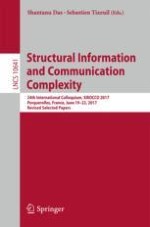2017 | OriginalPaper | Chapter
Effective Edge-Fault-Tolerant Single-Source Spanners via Best (or Good) Swap Edges
Authors : Davide Bilò, Feliciano Colella, Luciano Gualà, Stefano Leucci, Guido Proietti
Published in: Structural Information and Communication Complexity
Publisher: Springer International Publishing
Activate our intelligent search to find suitable subject content or patents.
Select sections of text to find matching patents with Artificial Intelligence. powered by
Select sections of text to find additional relevant content using AI-assisted search. powered by
